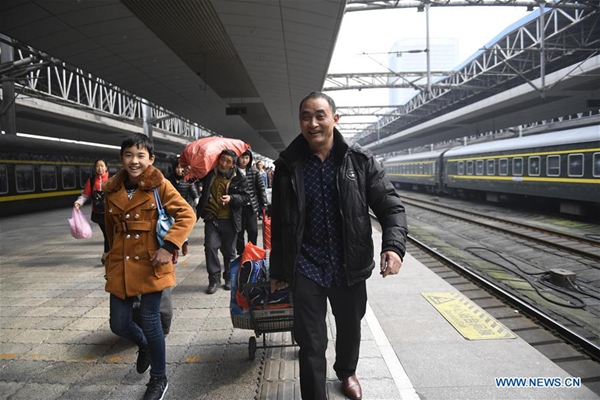Is the 'home leave' policy out of date?
- By Zhu Bochen and Chen Xia
 0 Comment(s)
0 Comment(s) Print
Print E-mail China.org.cn, October 25, 2019
E-mail China.org.cn, October 25, 2019

It might have been a jaw-dropping experience for many in China last weekend as they came across a news report claiming that experts have suggested canceling a major category of their holiday entitlement, the "home leave."
Unlike in some other countries, the concept of "home leave" in China is not necessarily only for people working abroad. People working away from home in another city can also apply for this leave. Generally speaking, it grants employees of various kinds of institutions and enterprises in China a 20-to-30 days' break every year to visit their spouses or parents who live in other cities in the country. The duration may vary depending on one's marital status.
Why was the leave introduced in China in the first place? Why are experts considering on changing it? Is there another solution?
The "home leave" was first introduced in February 1958. In a provisional regulation issued by the State Council, workers and staff were granted "home leave" because it often took days, if not weeks, for them to travel to visit their families in another city or village. In March 1981, the State Council specified the duration of "home leave" for employees working in state organs, people's organizations, enterprises owned by the whole people and public institutions.
Lin Jia, professor of the Law School of Renmin University, noted that the "home leave" was introduced against a special background. In the 1980s, China was under a planned economy and hadn't started the labor system reform. "It was rather difficult for people to travel to other places to visit their families. The 'home leave' was designed to address the needs of these people," Lin said.
In the new century, China has seen remarkable improvements in its social environment, in particular the infrastructure and labor system. The trips back to one's hometown are no longer so time-consuming and tiring, and many other national holidays and vacations have been granted, so that the term "home leave" is rarely used by Chinese people. Thus, some experts believe it is high time that China cancels it.
However, Zhang Yi, head of the National Institute of Social Development of the Chinese Academy of Social Sciences, suggests that the system of "home leave" should be revised instead of being canceled altogether, taking into account the current situation.
China has an aging population, so some people need to travel frequently to their hometown to look after their parents. Besides, it's not rare for a couple to live in different cities.
Zhang believes that the "home leave" should be kept to meet people's needs, but he suggested that some revisions should be made.
"In all these years, 'home leave' only applied to those working in state-owned institutions and enterprises, while the employees of institutions and enterprises of other ownership can't enjoy this entitlement. Therefore, some people have strong opinions about it. The original intention of introducing the leave was correct. If it can be introduced to all employees nationwide, there will be no objecting voices," said Zhang.
Meanwhile, some scholars suggest replacing "home leave" with an extended annual leave for the majority of people, while still keeping this leave for those working overseas or in specifically-designated occupations.






Go to Forum >>0 Comment(s)